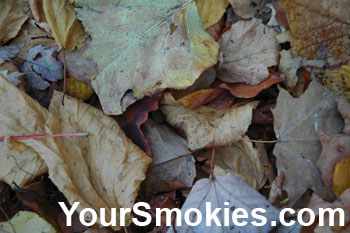Effective immediately the National Park Service has issued a ban on all backcountry campfires in the entire Great Smoky Mountains National Park (GSMNP) due to and extremely high fire danger throughout the park and surrounding areas.
This year's drought has had a tremendous impact on the GSMNP and now that the fall fire season has kicked in due to the fall leaf litter on the ground and desiccated leaves on the trees the fire danger has reached a level where a ban on back country fires in backcountry campgrounds and shelters is necessary to protect the park against wildfires.

The picture above was taken this morning on the Baskins Creek Trail in the Roaring Fork section of the National Park bordering Gatlinburg Tennessee and clearly shows that the leaves are browner and dryer than normal for this time of year and I feel that the extensive damage to the Eastern Hemlocks throughout the GSMNP caused by the invasive pest called the Hemlock Woolly Adelgid have further added to the fire danger.
Campers are still allowed to make campfires in any of the developed campgrounds found throughout the Great Smoky Mountains National Park as well as designated picnic areas as long as caution is used and fires are only made in designated fire rings and grills.
According to the GSMNP Superintendent Dale Ditmanson "The burn restriction is being placed to reduce the potential for human-caused uncontrolled wild land fires to occur within the Park's backcountry during this period of extreme fire danger and drought conditions. This is the second fire ban that has been imposed this year, which is quite unusual. Also extremely unusual is the number of free-running springs that are dry in the backcountry and along the Appalachian Trail."
High fire risk can further be reduced by visitors to the park not parking cars on any piles of leaves that may form in parking areas and on road sides as hot mufflers and tailpipes can cause the leaves to ignite. If you must smoke within the National Park boundaries make sure smoking material is completely extinguished prior to appropriate disposal. Appropriate disposal does not mean out of your car window or on a trail!
Fires in grills and fire rings in developed campgrounds must be extinguished by heavily soaking embers and ash in water to be sure that smoldering embers do not flare up.
No comments:
Post a Comment